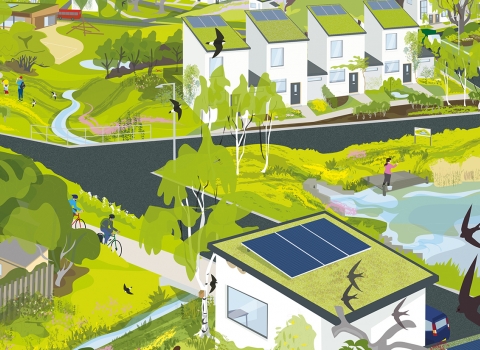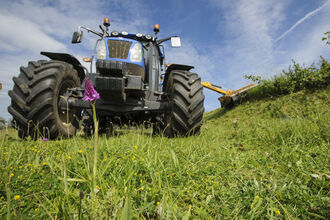
Planning - NickPollard (RSWT)
Planning and development
The planning process and how you can help
Part of our work involves campaigning to secure positive outcomes for wildlife within the planning system.
New buildings and infrastructure can have a significant impact on wildlife, but some planning proposals offer excellent opportunities to benefit nature through habitat creation or enhancement. We work hard to influence planning decisions and the policies which guide them, to ensure planning proposals make a positive contribution towards the protection of local wildlife. We also support residents to put together their own planning responses with our help and guidance.
Whilst we cannot write responses to every planning application, we prioritise key and strategic work and support people to make more effective planning responses and objections.
If you want to respond or object to a local planning application, we can help. Read this page and download our helpful resources. These documents will help you assess and respond to planning applications in your local area:
News and Updates
Have your say - Coventry's Climate Change Strategy
Coventry City Council have created a Climate Change Strategy which is out for public consultation until 7th July.
Members of Warwickshire Wildlife Trust who live in and around the Coventry area may be interested to see Coventry’s draft climate change strategy which is out for public consultation until 7th July.
You can view the webpage and the strategy on the Coventry City Council website.
Read our key concerns and comments here.
Levelling Up Paper
Since our detailed national objections to the Planning White Paper: Planning for the Future, to the Government in 2020, the Government has since taken a step back from the White Paper and focused on pushing their wider ‘Levelling Up’ agenda. This legislation the ‘Levelling up and Regeneration Bill’ is still working its way through Parliament and was last discussed in June and a paper published in February 2022. This incorporates some of the ideas previously presented in the Planning White Paper, although a lot have now fallen to the wayside.
Key messages in the paper are planning reform and making homeownership a reality, with an aim to make local plans simpler and shorter and a new Infrastructure Levy. There was also a declared ambition for supporting environment protection, including support for the transmission to net zero, as well as continued emphasis on digital technologies for consultation. A worry for some of our Members. The paper also includes a push for more support for employment land and brownfield land, requirement for LPAs to produce environmental outcome reports, and requirement for Local plans, to contribute towards the mitigation of and adaption to climate change.
A lot of the ideas previously in the white paper have now disappeared thanks to detailed objections and lobbying like the one we produced, with only Infrastructure Levy changes remaining. Zoning local plans amongst the other changes have now been removed, with just reference to simplifying the local plan process.
We will continue to lobby for more environmental protection as the Bill passes through parliament and on future public consultations.
The Environment Act
The Environment Act became law on 9 November 2021 and now has to be used as part of the planning process on applications.
We lobbied at earlier stages to push for more environmental protection and are very pleased to see that 10% Biodiversity Net Gain is now included as a legal requirement, as well as Nature Recovery Strategies, which WKWT is currently working on in this area.
In detail, the Environment Act will help halt the decline in species by 2030 and requires new developments to improve or create habitats for nature, and tackle deforestation. The act includes a new legally-binding target on species abundance for 2030, which will help to reverse declines in British species. The act includes the creation of Local Nature Recovery Strategies which are key to helping build Nature Recovery Networks across the country. The act also includes a mandatory 10% ‘Biodiversity Net Gain’ requirement on new development. Which we at WWT will be continuing to push as a minimum through local development ad local plans.
You can be an advocate for nature by:
- Responding to planning applications which could affect wildlife or have the potential to create more space for wildlife. You can let your local councillors and those on the planning committee know why you are objecting and encourage them to support your view.
- Finding out when your local authority is consulting on its Local Plan and Supplementary Planning Documents. Insist on strongly worded policies to protect wildlife, wild and green spaces.
- Finding out if your parish or town is putting together a Neighbourhood Plan. You can ask for local wildlife sites to be officially designated as ‘Local Green Spaces’, and for the creation of new wildlife-rich green space as part of the plan.
- Recording animals and plants that are present in your local area. Share records that you are certain about with your local records centre. This information is used when the Council Planning Officer and the Planning Committee are making decisions about planning applications.
- Reporting suspected wildlife crime to the Police wildlife department, and breaches of planning conditions to your local authority.
- Talking to your MP about campaigns or changes in policy that you want them to support, or highlighting a particular story or problem in your area.
More space for nature, more people on nature's side
Forward Planning
The Trust campaigns both locally and nationally to ensure that relevant planning documents contain strong policies that promote wildlife protection and enhancement as a vital component of sustainable development. This predominantly involves responding to Local Plan consultations, strategies and guidance documents to ensure that all future development is located and designed in a way that is both sensitive and beneficial to wildlife. We also encourage residents to make their own local plan responses, and share our information and guidance documents to support that.
Read our planning report on how the planning system can help our health, nature and climate.
Applications
The Trust monitors and responds to planning applications throughout Warwickshire, Coventry and Solihull. We screen weekly planning lists using recent habitat data for the county to identify key strategic and priority planning applications that are likely to have the greatest impact on, or opportunities for, wildlife. Drawing on objective evidence and our knowledge of planning policy and wildlife legislation, we seek to ensure that developments avoid and mitigate adverse effects on important sites, habitats, and species and incorporate features that secure long-term gains for wildlife. Whilst we have to prioritise key applications, we also support residents to make their own more successful planning responses through our planning guidance notes (above).
Community Support
The Trust supports local campaign groups and individuals that wish to stand up for wildlife. We aim to empower local groups and individuals by providing the necessary tools and guidance to campaign effectively on planning and wildlife matters.
The Wildlife Assessment Check is a free online tool, designed to help householders and smaller developers who are making a planning application. The tool allows applicants to check whether their proposed site and works are likely to require expert ecological advice before making a planning application. It aims to smooth out the planning application process for applicants by encouraging them to address potential ecological impacts early on, reducing unnecessary delays and costs. It also aims to support those local planning authorities who lack in-house ecological capacity, by encouraging applicants to take responsibility for ecological impact as a part of their application. Please feel free to share the links with your local networks.
Planning Advice
The Trust works closely with local authorities, other environmental organisations, and government agencies to provide advice to developers on a range of planning and wildlife matters. This enables us to identify any wildlife issues and opportunities at an early stage of the planning process so that solutions can be found and designed into the development.
Housing Vision
The Wildlife Trusts’ blueprint for new nature-friendly homes highlights the myriad of social, environmental and economic benefits of this approach:
- Benefits for wildlife – better protection for wildlife sites, more space for wildlife, improved connectivity and buildings that are more wildlife-friendly
- Benefits for residents – daily contact with nature, improved health, protection against climate extremes, safer transport routes, good sense of community
- Benefits for the economy and wider society – cost-effective environmental protection, employment, space to grow local food, healthier and happier communities putting less pressure on health and social services
- Benefits for developers – satisfied customers, market value, enhanced brand, improved recruitment, improved environmental ranking
Read The Wildlife Trust's "Homes for people and wildlife - how to build housing in a nature-friendly way"

Nightmare before Christmas: worst environmental regression in decades looms
Labour’s list of broken promises mounts
The Wildlife Trusts call out inaccuracies in Commons debate on Planning & Infrastructure Bill
During the Commons Report stage of the Planning Bill, the Minister and some MPs made incorrect statements about the relationship between…

Government digs grave for wildlife
New proposals on Biodiversity Net Gain from UK Government will harm whole communities so that a few can profit more.
